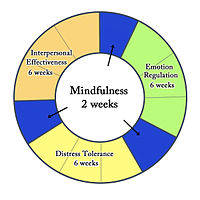
Photo from wikipedia
BACKGROUND Suicide in low- and middle-income countries (LMICs) accounts for 75% of the world's burden of suicide mortality and is the leading single cause of death among Nepali reproductive age… Click to show full abstract
BACKGROUND Suicide in low- and middle-income countries (LMICs) accounts for 75% of the world's burden of suicide mortality and is the leading single cause of death among Nepali reproductive age women. To advance treatment for suicidal behaviors in LMICs, a single-case experimental design (SCED) was conducted of a culturally adapted Dialectical Behavior Therapy skills intervention for Nepali populations (DBT-N). METHOD Ten Nepali women with histories of suicidality participated in the 10-session intervention. Outcomes of emotion regulation, suicidal ideation, depression, anxiety, resilience, and coping skills use were measured at multiple time points pre-intervention, during, and at follow-up. Qualitative interviewing assessed DBT-N's feasibility and acceptability. RESULTS Participants showed improvements in emotion regulation over the course of treatment, which were associated with increased skills use. Rapid, sustained reductions in suicidal ideation and improvements in resilience were observed after DBT-N initiation. CONCLUSION This SCED supports conducting further evaluation of DBT-N through controlled trials with emotion regulation as a target mechanism of action for reducing suicidal behaviors in LMICs.
Journal Title: Journal of clinical psychology
Year Published: 2018
Link to full text (if available)
Share on Social Media: Sign Up to like & get
recommendations!